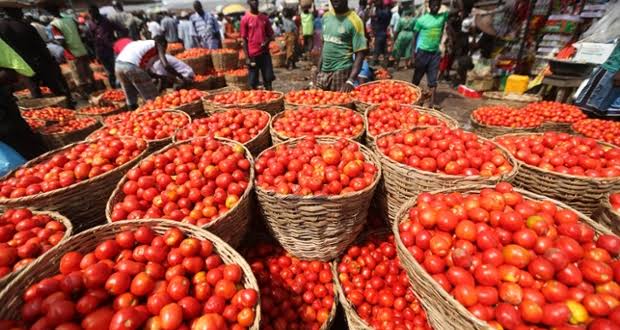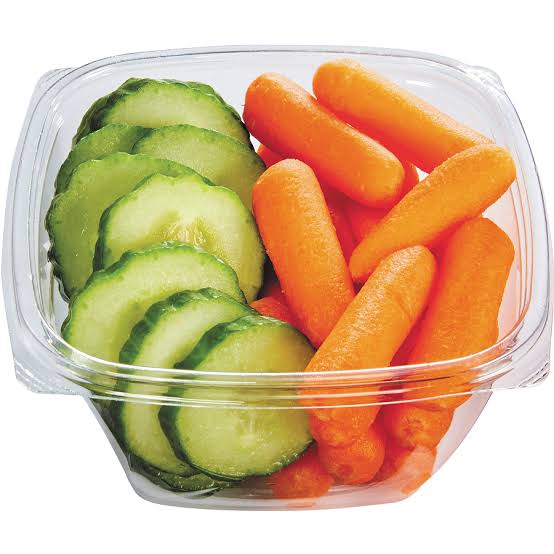News
Tomato Crisis: Nigerians Cry Out As Prices Hit Record High

By Fikayo Babalola
Nigerians have cried out as tomato prices hit record high.
Eko Hot Blog reports that as tomato prices continue to soar, Nigerians are finding ways to adapt, swapping out the pricey fruit for more affordable veggies in their beloved stew recipes.
And it’s not hard to see why with inflation hitting a whopping 33.69% in April 2024, according to the National Bureau of Statistics, many are feeling the pinch.
But Nigerians are nothing if not resourceful, and their culinary creativity is on full display as they find ways to make do without breaking the bank.
Sharing an alternative recipe to tomato stew, Stephanie Vani, says that she learned the recipe of using carrot stew from a video on TikTok and has tried it out.
“I also saw the video of the cucumber stew, and I’m planning on trying that out too,” she expanded.
On Instagram, users are raving about their newfound love for unconventional stew ingredients.
Verere shared her successful experiment with cabbage stew, declaring it a “bang” and announcing plans to try cucumber and garden egg next.
“Quoting, I did cabbage stew this week, and it was a bang. Next week, cucumber; upper week, garden egg. New recipes till tomatoes will come and beg us,” she said.
Meanwhile, Aramide’s Kitchen joked about switching up her menu, saying, “Better update. As tomatoes are now expensive, if I eat this cucumber stew today, I will eat Banga stew tomorrow.”

Cucumber and carrot used as substitutes for tomatoes as the latter’s prices soar in the market
This new alternative is a nod to the versatility and creativity of Nigerian cuisine in the face of tomato scarcity.
Lamentations are soaring as the cost of alternative ingredients. A provision seller at EFAB market in Abuja said, “We have just five pieces of carrot for N500, and it’s the tiniest of it all.
“Even the carrot stew is very expensive, and if you want to do the carrot stew, you have to do other veggies as well.
“And the tiniest of bell pepper is N500, for what used to be sold for N100. So how many can you use to do your carrot stew?
“What people use now is an alternative to stew. There is no specific stew. Just use something to eat something. Pepper soup spices are trending. Nothing like stew again; we are now doing what we can afford.”
Also speaking with our correspondent, a tomato seller who gave his name as Abu, highlighted, “Basket of tomatoes is N18,000 while last two months, it was N10,000.
“A small plate of tomatoes now is N1,500. The biggest basket is over N100,000 while the medium size of cucumber is from N300.”
Professor Sheriffdeen Tella, an economist, who shared his insights with Eko Hot Blog, said, “Inflation is not just about a particular product, it is a general price increase. We know that inflation in Nigeria has been on for a long time.
“The issue of tomatoes being scarce has to do with an attack from insects, but in the short run, we cannot overcome it. In the long run, we will be able to overcome it. We know that there are tomato purée and all those things in the market.
“Generally, we have been spending a lot of money on food, and part of the inflation has to do with the importation of food, so tomato is going to be part of those food items.
“And I think people have to look for alternatives, and they are getting alternatives. It’s better to face that alternative while the issue of pesticide is being tackled by the government.”
Meanwhile, economist Leo Ukpong attributes the surge in tomato prices to insecurity and transportation challenges, highlighting the need for a comprehensive approach to address the underlying factors driving food price inflation.
“The major tomatoes are from the middle belt to Plateau, Jos, and Taraba. One of the biggest problems in that area is insecurity.
“So farmers are not able to farm the way they used to farm. And even when they farm, moving them is a problem because of insecurity.
“I have been reading recently about the new hybrid tomatoes that people have been planting. Hybrids came because they wanted to resist the attack of insects instead of using insecticides.
“The problem with those hybrid tomatoes is you don’t have the seeds to replant, and you have to buy the seeds. They look nice in most supermarkets, but it’s too expensive.
“So, insecurity and transportation crisis have cut down on the quantity of tomatoes available to the average market person.”
Click below to watch our video of the week:
Advertise or Publish a Story on EkoHot Blog:
Kindly contact us at ekohotblog@gmail.com. Breaking stories should be sent to the above email and substantiated with pictorial evidence.
Citizen journalists will receive a token as data incentive.
Call or Whatsapp: 0803 561 7233, 0703 414 5611







